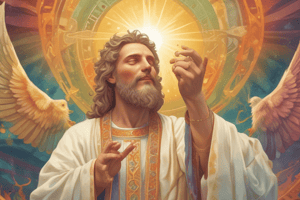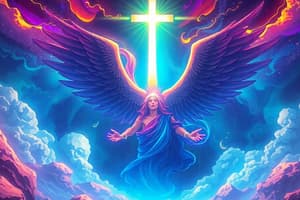Podcast
Questions and Answers
What is the meaning of the first verse of the Introduction to the Midnight Praises?
What is the meaning of the first verse of the Introduction to the Midnight Praises?
- Let us glorify God without asking for any requests
- Let us pray to the Lord of hosts
- Arise, O children of the light, let us praise the Lord of hosts (correct)
- Let us fight against the evil spirit
What is the Coptic word for 'canticle' in the Midnight Praises?
What is the Coptic word for 'canticle' in the Midnight Praises?
- Glory
- Hoos (correct)
- Ten Thino
- Psalms
What is the significance of the children of Israel crossing the Red Sea in the context of the First Canticle?
What is the significance of the children of Israel crossing the Red Sea in the context of the First Canticle?
- It is a reminder of the power of Moses as a prophet
- It symbolizes the salvation of humanity from Satan through the incarnation of Jesus Christ (correct)
- It represents the victory of the Israelites over the Egyptians
- It represents the defeat of Pharaoh and his soldiers
What is the main theme of the Second Canticle?
What is the main theme of the Second Canticle?
What is the purpose of the Commemoration of the Saints?
What is the purpose of the Commemoration of the Saints?
What is the meaning of the Greek word 'doxology'?
What is the meaning of the Greek word 'doxology'?
What is the significance of Psalms 148, 149, and 150?
What is the significance of Psalms 148, 149, and 150?
What is the purpose of Theotokia in the Psalmody book?
What is the purpose of Theotokia in the Psalmody book?
Flashcards are hidden until you start studying
Study Notes
The Church and Praise
- The church is the body of Christ, uniting all members, including the striving church on earth and the victorious church in heaven.
- Praising God is a key aspect of the church, sharing with angels and saints in glorifying God.
Importance of Praise
- Praising is the work of angels and saints, glorifying God without asking for requests.
- Praising has the power to:
- Change evil habits and sanctify thoughts and senses.
- Transfer Christian dogma throughout generations.
- Fight and triumph over evil spirits.
The Midnight Praises
- Introduction to the Midnight Praises: "Ten Thino", an invitation to arise and praise the Lord of hosts.
- The Midnight Praises consist of:
- Four canticles (Hoos): praises from the Holy Bible.
- Lobsh: explanations of the canticles, chanted after the first and second canticles.
- Psalmody: praises and glorifications to God.
The Canticles (Hoos)
- The First Canticle: Exodus 15, praising God for salvation and triumph over Pharaoh, representing the devil.
- The Second Canticle: Psalm 135, praising God for mercy and goodness, with the refrain "His mercy endures forever".
- The Third Canticle: Daniel 3, praising God for salvation and victory over the devil, with the story of the three young youths in the fiery furnace.
- The Fourth Canticle: Psalms 148, 149, and 150, inviting all creation and humanity to praise God.
Other Elements of the Midnight Praises
- Psali: hymns or glorifications to Jesus Christ, with two types: Adam and Batos.
- Theotokia: glorifications to St. Mary the mother of God, remembering prophecies and symbols of incarnation.
- Antiphonary (Defnar): the story of the saint of the day, sung in a hymnal tune.
- Conclusion of the Theotokias: fosters feelings of repentance, confession, and trust in God's mercy, or encourages waiting for the second coming of the Lord.
Studying That Suits You
Use AI to generate personalized quizzes and flashcards to suit your learning preferences.




